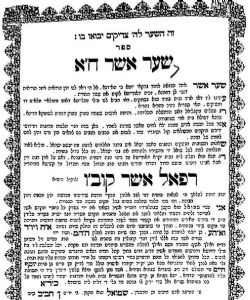A Short Tribute
Hacham Raphael Asher Kovo, son of Hacham Yaakov Kovo, was born in 1797 in Salonica.
He began his Torah studies with his father, Hacham Yaakov Kovo, and his uncle, Hacham David Barzilai.
In 1818, at the age of twenty-one, he wrote a Halakhic ruling releasing an Aguna [a woman bound by marriage to an absent husband]. He was subsequently appointed to be a dayan in Salonica.
In 1849 Hacham Raphael Asher Kovo was appointed Rabbi of Salonica, alongside Hacham Hannanya Saporta. Hacham Hannanya Saporta died in 1856 and Hacham Raphael Asher Kovo continued to officiate alone as the city's rabbi. During his term he organized the city's educational institutions; he encourage Salonica rabbis to write books and even wrote introductions to their books.
In 1857, Hacham Raphael Asher Kovo met with the Turkish sultan and was, at the time, the first to receive the title of Hacham Bashi for the Salonica community. The sultan presented Hacham Raphael Asher Kovo with an honor award, and contributed money to Salonica's Jewish educational institutions.
Hacham Raphael Asher Kovo passed away on 19 Tevet, 5635 and was buried in Salonica. A collection of Hacham Raphael Asher Kovo's halakhic Responsa and several of his written sermons appear in the book Shaar Asher.
A few quotes from the Rabbi on 'Israel and the Nations' in which he allows reading from a Bible printed by non-Jews who are not heretics
The esteemed rabbis of the glorious city of Constantinople, may God protect it, sent a missive about the 24 books of the Bible that were reprinted in London by non-Jews, saying they were invalid and that it is forbidden to read from them, and that by law they should be burned. For reasons of their own they said that they would hide them from sight, and we, in all modesty, were astounded at their trepidation and are unaware of any such law… In the first versions in which changes were made to strengthen their faith, their intentions and thoughts were on foreign worship. This is similar to the disciples of "that person" who twisted the living words of God and whom RASH"I interpreted to refer to heretics, as we mentioned above. The non-Jews of our time, who do not indulge in foreign worship and follow their usual habits and forefathers' customs, are clearly and simply not heretics, and it is permitted to read all books they have published, with the exception of a Torah scroll written by a non-Jew, which is to be archived if discovered, for we demand that the writing be done for its own sake; it may also not be read from in public.
Shaar Asher, Part 1, Yoreh De'a, Section 15, p. 28b – 29b, Haktav Institute Publishing, Jerusalem 1989
